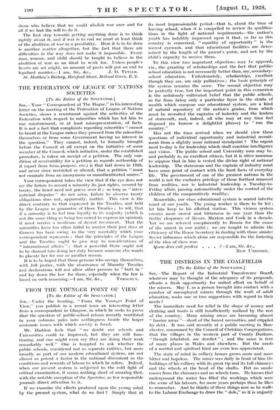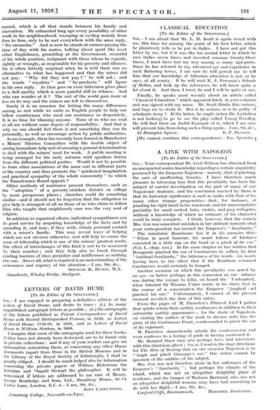THE DISTRESS IN THE COALFIELDS
[To the Editor of the SPECTATOR.] SIR,—The Report of the Industrial Transference Board, whatever may be thought of the adequacy of its proposals, affords a fresh opportunity for united effort on behalf of the miners. May I, as a person brought into contact with a number of unemployed miners through the work of adult education, make one or two suggestions with regard to their needs ?
The immediate need for relief in the shape of money and clothing and boots is still insufficiently realized by the rest of the country. Many mining areas are becoming almost famine areas "—short of the barest necessities, and crippled by debt. It was said recently at a public meeting in Man- chester, summoned by the Council of Christian Congregations, that the villages in the western part of County Durham, " though inhabited, are derelict " ; and the same is true of many places in Wales and elsewhere. But the needs of a mental and spiritual kind are even less appreciated.
The state of mind in colliery homes grows more and more bitter and hopeless. The miner sees daily in front of him the buildings of his colliery with its great tip and its tall chimneys and the wheels at the head of the shafts. But no smoke comes from the chimneys and no wheels turn. He knows that underground the water has filled the workings which were the scene of his labours, for more years perhaps than he likes to remember. And he thinks of these things now as he walks to the Labour Exchange•to draw the " dole," as it is unjustly named, which is all that stands between his family and starvation. He exhausted long ago every possibility of other work in his neighbourhood, tramping or cycling wearily from firm to firm, only to be met everywhere with the same reply, " No vacancies." And so now he stands at corners passing the time of day with his mates, talking about sport like most other Englishmen, grumbling at the Government, resentful of his whole position, indignant with those whom he regards, rightly or wrongly, as responsible for his poverty and idleness. He is often bitterly sceptical when he is told there was no alternative to what has happened and that the mines did not pay. Why did they not pay ? " he will ask ; and the words " royalties " and " by-products " will figure in his own reply. As time goes on even bitterness gives place to a dull apathy which is more painful still to witness. And who can wonder at it ? The rest of the world goes more or less on its way and the miners are left to themselves.
Surely it is an occasion for letting the many differences _among us rest while we unite as English people to help our fellow countrymen who need our assistance so desperately. It is no time for blaming anyone. None of us who use coal at all are without some degree of responsibility. And that is why no one should feel there is not something they can do personally, as well as encourage action by public authorities.
As an example, there has recently been formed in Manchester a Miners' Distress Committee with the double object of raising immediate help and of arousing a general determination to deal with the miners' need for work. A public meeting is being arranged for the early autumn with speakers drawn from the different political parties. Would it not be possible to form other associations of the same sort in different parts of the country and thus promote the " quickened imagination and practical sympathy of the whole community " to which the Transference Board appeals ?
Other methods of assistance present themselves, such as the " adoption " of a poverty-stricken district or village by more prosperous places ; churches could do something similar—and it should not be forgotten that the obligation to give help is strongest of all on those of us who claim to follow Him who taught that neighbourly care was the very soul of religion.
In addition to organized efforts, individual sympathizers can do good service by acquiring knowledge of the facts and by spreading it, and may, if they wish, obtain personal contact with a miner's family. This may reveal ways of helping which are not obvious otherwise, and will help to create the sense of fellowship which is one of the miners' greatest needs. The effect of interchanges of this kind is not to be measured by their number ; and they help also to break through existing barriers of class prejudice and indifference as nothing else can. Above all, what is required is an understanding of the seriousness and urgency of the situation.—I am, Sir, &c., SPENCER R. HURST, M.A.
Stoncheads, Whaley Bridge, Stockport.





























 Previous page
Previous page